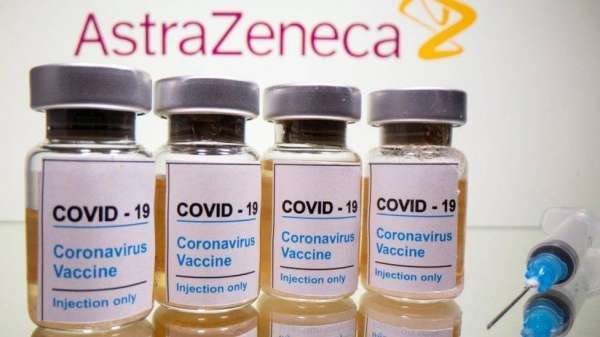Latest News
- New Employer File Opening Service Launched By PAM Via Sahel Busi...
- Issuing Work Permits Based On Academic Certificates And Experien...
- Annual Evaluations Completed For 14,000 Ministry Of Public Works...
- New Airport Project: Power Supply Activation Begins Today
- HH The Amir Sheikh Meshal Al-Ahmad Al-Jaber Al-Sabah Embarks On...
- Kuwait's Public Authority For Manpower Implements Strategic Meas...
- HH The Amir Attends The 23rd Sheikh Salem Al-Ali Al-Sabah Inform...
- Meteorological Department Warns Of Scattered Showers With Thunde...
- Accident Reveals Drunk Driver And Liquor Bottles
- Charges Of Forgery In Kuwait Telecommunications Swindle Case
- KPC Must Distribute Jobs Transparently
- Kuwaiti Faces Questions About Luxury Vehicle Scam
Us Study Finds Astrazeneca Covid-19 Vaccine Effective, Doesn't Increase Blood Clot Risk

AstraZeneca's COVID-19 vaccine showed 79 percent efficacy against symptomatic disease and 100 percent efficacy against severe disease and hospitalization in a new, US-based clinical trial, the company said on Monday.
The findings from the new Phase 3 trial, which included more than 32,000 participants, may boost confidence in the vaccine, which was originally developed by the University of Oxford.
The trial showed that the vaccine was well-tolerated and identified no safety concerns, the company said. An independent committee "found no increased risk of thrombosis or events characterized by thrombosis among the 21,583 participants receiving at least one dose of the vaccine," according to AstraZeneca.
The new data came from a Phase 3 clinical trial conducted in the US, Chile, and Peru. AstraZeneca says it plans to submit the findings to a scientific journal for peer review.
Ruud Dobber, president of AstraZeneca's biopharmaceuticals business unit, said on CNBC on Monday that the company plans to apply for emergency use authorization from the US Food and Drug Administration in the first half of April. If authorized, it would be the fourth Covid-19 vaccine available in the United States.
For its part, Oxford said the findings add "to previous trial data from the United Kingdom, Brazil and South Africa, as well as real-world impact data from the United Kingdom" according to a press release from the university.
As part of the trial, more than 32,000 adult volunteers recruited across all ages received either two doses of the vaccine or a placebo vaccine at a four-week interval.
About 79% of trial participants were White, 22 percent were Hispanic, 8 percent were Black, 4 percent were Native American and 4 percent were Asian.
About 20% of participants were 65 years and over and approximately 60 percent had conditions linked with a higher risk of severe COVID-19, such as diabetes, severe obesity, or heart disease.
In patients 65 years and older, vaccine efficacy was 80 percent, AstraZeneca said — echoing the overall trial results — which is notable as some countries initially did not authorize the vaccine for use in this older age group, citing a lack of data from earlier trials.
"It is clear this vaccine has very good efficacy (remember that 60% was, prior to any trials being started, regarded as a good target), and that this efficacy does not show a notable decline at older ages," Stephen Evans, a professor of pharmacoepidemiology at the London School of Hygiene & Tropical Medicine, said in a statement to the Science Media Centre in the UK.
Evans called previous assertions that the vaccine may be ineffective in older ages "totally unjustified."
The Oxford-AstraZeneca vaccine became the subject of controversy earlier in the month when a number of European countries including Norway, France and Denmark decided to temporarily suspend its rollout due to reports of blood clotting in patients post-inoculation.
An emergency investigation by the European Medicines Agency (EMA) came to the conclusion last Thursday that the vaccine is "safe and effective" in preventing coronavirus and "not associated with an increase in the overall risk of thromboembolic events, or blood clots."
Lead Investigator for the vaccine and professor of Paediatric Infection and Immunity at Oxford University Andrew Pollard said the AstraZeneca data was "consistent with the results from Oxford-led trials," adding that he expected a "strong impact against COVID-19 across all ages and for people of all different backgrounds from the widespread use of the vaccine."
SOURCE SAUDIGAZETTE
Trending News
-
 The Ministry Connects With Violators Of Residency...
23 April 2024
The Ministry Connects With Violators Of Residency...
23 April 2024 -
 AstraZeneca Admits Covid Vaccine Can Cause Rare Si...
29 April 2024
AstraZeneca Admits Covid Vaccine Can Cause Rare Si...
29 April 2024 -
 Work Permits Will Be Issued For One Year Under The...
27 April 2024
Work Permits Will Be Issued For One Year Under The...
27 April 2024 -
 3 Expats Caught In Salmiya With 213 Bottles Of Loc...
23 April 2024
3 Expats Caught In Salmiya With 213 Bottles Of Loc...
23 April 2024 -
 Kuwait Unveils Monumental Solar Energy Project For...
06 May 2024
Kuwait Unveils Monumental Solar Energy Project For...
06 May 2024 -
 Al-Nuer Festival Celebrates Kuwaiti Agriculture Wi...
22 April 2024
Al-Nuer Festival Celebrates Kuwaiti Agriculture Wi...
22 April 2024 -
 Peak-time 'cut-offs' Raise Fears Of An Electricity...
22 April 2024
Peak-time 'cut-offs' Raise Fears Of An Electricity...
22 April 2024 -
 Gulf Electrical Interconnection Project Will Boost...
04 May 2024
Gulf Electrical Interconnection Project Will Boost...
04 May 2024 -
 Road Trip From Kuwait To Bahrain Via Saudi: Travel...
22 April 2024
Road Trip From Kuwait To Bahrain Via Saudi: Travel...
22 April 2024 -
 Kuwait Banks Seek Clarity From Central Bank On Cit...
04 May 2024
Kuwait Banks Seek Clarity From Central Bank On Cit...
04 May 2024











Comments Post Comment